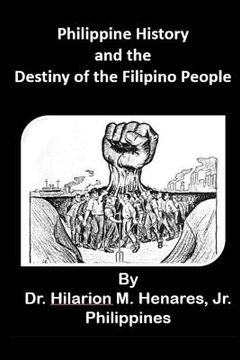Reseña del libro "Philippine History and the Destiny of the Filipino People (en Inglés)"
Preface. A Summary of the Book The history that is about to be written, will be written from the perspective of one who at the time of writing is already 93 years of age and who participated in a big way in the history of the times he lived in, who had a maternal grandfather who was also involved in the history of the previous 70 years, who read one book every day from the age of 10 to the age of 80, who lived the lives and absorbed the thoughts of the authors of 25,500 books he read, and who had a beloved teacher in history, the famous Jesuit Father Horacio de la Costa of Ateneo, who began his lectures with "What I am about to tell you is the chismis (gossip) of a nation aborning." From the perspective of the author, Filipino people from the time they were "discovered" by Ferdinand Magellan in 1521, mercifully fell asleep, two oceans away from Mother Spain, were spared the violence of war, the plagues. and the ferment of change that the whole continent of Europe was blighted with, and lived lives so much better than the peasants of the advanced countries. It was only in the late 19th century after the opening of the Suez Canal, that the Filipinos woke up, awakened by three heroes: Jose Rizal who inspired them to be a nation, Andres Bonifacio who inspired them to fight for their freedom, and Emilio Aguinaldo who took on two great powers -- Spain which he defeated and the United States which defeated him - and in the process, forged a nation for four glorious years from 1898 to 1902, gave it a flag, an anthem and a constitution, and made it the first in all Asia to break the shackles of Western Colonialism and the first democracy in all of Asia, the last of the Hispanic colonies and the first Asian country to be liberated, as the children of the French Revolution. From the perspective of the author, the American occupation of the Philippines, accomplished with much cruelty in the Philippine American War, and so shamefully with the Treaty of Paris, by which the United States paid Spain $20 million for the Philippines, which Spain no longer owned - was marked by the understanding that the United States would prepare the Filipinos for independence, a pledge that was incorporated in a remarkable document drafted by the US Secretary of War Elihu Root, giving the defeated country, the entire Bill of Rights gratis et amore, something the Anglo-Saxons earned for 647 years at the cost of so much blood and the hangman's knot. The only counterpoint to Elihu Root was the Military Governor General Arthur MacArthur who acted like he was William the Conqueror and dealt with Filipinos as if he was King of the Philippines. Nevertheless, the United States fulfilled its pledge. And the American Occupation was dominated by one leader, Manuel L. Quezon, president of the Philippine Commonwealth, who steered his country to "total, absolute and complete independence" or so he thought. Interrupted by the Japanese attack and occupation during World War II, in a war as cruel and devastating as the Philippine-American War from 1898 to 1902, President Quezon died in exile in the United States. General Douglas MacArthur, the son of General Arthur MacArthur, fulfilled his personal pledge to liberate the Philippines at the cost of 100,000 Filipino lives, despite the fact that his role was unnecessary, that the USA was about to win the War with the Atomic Bomb. ------------ About the Author+ + + Dr. Hilarion M. Henares Jr., known as Larry Henares, is a graduate of Ateneo de Manila, University of the Philippines, and the Massachusetts Institute of Technology, an engineer, economist, educator, big businessman, writer, civic leader, public servant, and hobbyist (guns, books, amateur radio and electronics). He is a film maker who won the Famas Academy Award for the Best Documentary of the Year. He was a businessman who was awarded Young Businessman of the Year, and the Industrialist (more inside)

